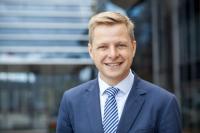Vilnius mayor hails appetite for change

FDI into Lithuania’s capital, Vilnius, has risen in recent years, especially in technology and fintech. fDi caught up with mayor Remigijus Šimašius to find out what underlies this recent success.
Q: Vilnius has attracted significant FDI recently. What are the reasons behind this?
A: One reason is the ‘gene of Vilnius’. Vilnius is a young city and we have a population that is hungry for change and prosperity. After the collapse of the Soviet regime there was a big opportunity suddenly, with an immediate explosion of new initiatives. The dynamism is much higher here than the majority of other cities. We have to be innovative and that’s in the spirit of the people. A very big part of the population is under 35, which is not very typical for this part of the region.
Another reason is we have clear policies, such as the ‘no-excuse’ open data policy in our municipality. That means unless it is restricted by European regulations or for security reasons, all municipal data is open. We have a clear focus on the shared economy. I’ve seen many cities that have this focus, but more of a theoretical focus. In our case it is very practical.
When I became mayor five years ago, there was a big question about how to make the city more attractive for both start-ups and big companies. Big companies wanted us to invest more in kindergartens, public transportation and public spaces, which provides a better economic environment in the city. We are taking this seriously. In terms of public transportation and kindergartens we had very serious problems, but now we are on a good level, and we have been investing a lot in public spaces.
Q: What are the target sectors for Vilnius, and how are you fostering them?
A: One target sector is fintech. We have managed to foster a very creative atmosphere in the financial sector and a playground for new investment and disruptive technologies. [But Vilnius is] not an island: we have a very extended ecosystem because we have big corporate players, shared services centres and people creating start-ups. We have a very innovative central bank, which also has a sandbox environment. We discuss matters with our central bank, and we already have a common approach. One of the reasons why is that we have quite good econometric and mathematical education, and we have enough talented people who want to work in [the fintech] area.
Another area is ICT and tech in general. We want to take the risk and invest in new things. We’re proud to have a unicorn founded in our city, Vinted, which deals with the sale of used clothing. Many specific tasks are also performed in Vilnius, such as the core services of Uber and Nasdaq.
Life sciences is another sector of strength for us as we have very good researchers and scientists. We have three big companies and many start-ups that I expect to grow into large companies. I think life sciences is the biggest opportunity for us because people are always looking for talent and I think the availability of talent in life sciences here is the biggest.
Q: What are Vilnius’ biggest challenges and how are you overcoming them?
A: The biggest challenge is education, because it is very clear that the world is changing very fast and will be changing even faster in the future. The question is how flexible is our education system, and does it allow integration when some other qualifications are needed. That is the biggest challenge for everyone in today’s world, including our city.
From an urban perspective, the challenge is how to have a very pleasant, competitive and functional city at the same time. We are trying to create a walkable city with green areas, which would be very inviting to different kinds of activities both during work and leisure time.
Q: Any closing thoughts?
A: In Vilnius we are very successful at joining history and nature, with a very progressive and modern future-oriented path. This is the secret recipe to make the city loved by talented people.
This interview was conducted before the global impact of the coronavirus was fully known.
This article first appeared in the April-June edition of fDi Magazine.

Global greenfield investment trends
Crossborder investment monitor
|
|
fDi Markets is the only online database tracking crossborder greenfield investment covering all sectors and countries worldwide. It provides real-time monitoring of investment projects, capital investment and job creation with powerful tools to track and profile companies investing overseas.
Corporate location benchmarking tool
fDi Benchmark is the only online tool to benchmark the competitiveness of countries and cities in over 50 sectors. Its comprehensive location data series covers the main cost and quality competitiveness indicators for over 300 locations around the world.
Research report
fDi Intelligence provides customised reports and data research which deliver vital business intelligence to corporations, investment promotion agencies, economic development organisations, consulting firms and research institutions.
Find out more.




